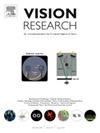The effects of feedback and task accuracy in serial dependence to orientation
IF 1.4
4区 心理学
Q4 NEUROSCIENCES
引用次数: 0
Abstract
Assimilative serial dependence in perception occurs where responses about a stimulus (e.g., orientation) are biased towards previously seen perceptual information (e.g., the orientation of the stimulus shown on the previous trial). This bias may occur to perceptual information from the previous trial, or to the response or decision made on the previous trial. We asked whether providing response feedback could change the serial dependence effect on the following trial. Twenty-one participants completed a task in which they adjusted an on-screen pointer to reproduce the orientation of a briefly-presented Gabor stimulus. They received feedback about the accuracy of their response that either reflected their actual accuracy or was random. We found significant positive biases to the stimulus and response only when the participant had received positive (“correct!”) feedback on that trial. When the inducer response had been incorrect, the effect was significant only to the response itself and not to the stimulus. Overall, we suggest that our participants demonstrated a bias towards the percept from the previous trial, which is better represented by the response than the stimulus for incorrect trials, and that this effect can be modulated post-perceptually by feedback.
反馈和任务精度对定向序列依赖的影响。
当对刺激的反应(例如,方向)偏向于先前看到的知觉信息(例如,在先前的试验中显示的刺激的方向)时,知觉中的同化序列依赖就会发生。这种偏差可能发生在前一次试验的感知信息上,也可能发生在前一次试验的反应或决定上。我们询问提供应答反馈是否会改变后续试验的序列依赖效应。21名参与者完成了一项任务,他们调整屏幕上的指针来重现一个短暂呈现的Gabor刺激的方向。他们收到了关于他们回答的准确性的反馈,这些反馈要么反映了他们的实际准确性,要么是随机的。我们发现,只有当参与者在试验中得到积极(“正确!”)的反馈时,他们才会对刺激和反应产生显著的积极偏见。当诱导反应不正确时,这种影响只对反应本身有意义,而对刺激没有意义。总的来说,我们认为我们的参与者表现出对先前试验感知的偏见,这种偏见在错误试验的反应中比在刺激中更好地表现出来,并且这种影响可以通过反馈在感知后被调节。
本文章由计算机程序翻译,如有差异,请以英文原文为准。
求助全文
约1分钟内获得全文
求助全文
来源期刊

Vision Research
医学-神经科学
CiteScore
3.70
自引率
16.70%
发文量
111
审稿时长
66 days
期刊介绍:
Vision Research is a journal devoted to the functional aspects of human, vertebrate and invertebrate vision and publishes experimental and observational studies, reviews, and theoretical and computational analyses. Vision Research also publishes clinical studies relevant to normal visual function and basic research relevant to visual dysfunction or its clinical investigation. Functional aspects of vision is interpreted broadly, ranging from molecular and cellular function to perception and behavior. Detailed descriptions are encouraged but enough introductory background should be included for non-specialists. Theoretical and computational papers should give a sense of order to the facts or point to new verifiable observations. Papers dealing with questions in the history of vision science should stress the development of ideas in the field.
 求助内容:
求助内容: 应助结果提醒方式:
应助结果提醒方式:


